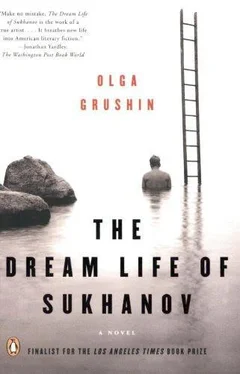“Mother, please,” he protested, “the kids are no longer kids, they don’t need—”
But her mincing steps were already pattering down the corridor. Sighing, he followed her from the living room, where she always served him tea out of some dim notion of good manners. She was waiting for him on the threshold of her tiny kitchen, looking back with an unexpected sly smile.
“Come on in,” she said, beckoning. “I want to show you something.”
Mildly surprised by this departure from routine, he stepped inside, dipping his head under a low arch—and saw it right away. On top of a squatting cupboard by the window, next to a tower of boxes containing the unpalatable sugared treats, stood a round cage. A small yellow bird on a miniature swing cheerfully moved its short tail up and down, and neatly deposited a compact white drop on a crumpled newspaper below.
“You’ve got yourself a canary,” he said, trying to keep the disgust out of his voice.
“Yes, isn’t she sweet,” said Nadezhda Sergeevna, pressing her hands together. “I’ve named her Malvina.”
“How nice. Where did you get it?”
“Oh, from an acquaintance. You do think the name suits her, don’t you?”
“What acquaintance?” he asked, his surprise deepening.
She mumbled vaguely about someone’s cousin staying with relatives on a visit, and then, clearly considering the matter closed, began to sigh over her acquisition, imploring him to look, just look at this dainty beak, the color of these feathers, these bright beady eyes, so pretty, so intelligent…. Growing bored, Sukhanov stared outside. An old man was hobbling along the pavement, once in a while bending to pick something up, a cigarette butt most likely; a homeless dog darted from one courtyard to another; and over at the corner he saw—with another inexplicable tremor of guilt, though weaker this time—Vadim dozing over a newspaper, behind a lowered window of the Volga. His mother kept talking. For some reason the bird did not sing, although she was sure it would in time, it just needed to feel welcome…. A new smell, a slightly acrid smell of fowl droppings, was stealthily seeping into the familiar smells of shortbread cookies and tvorog.
Stifling a yawn, Sukhanov began to take his leave.
“But Tolya, you do like her, don’t you?” Nadezhda Sergeevna asked from the doorway, smiling anxiously.
“As long as it makes you happy,” he said absently, as always searching for an elevator button, as always remembering a moment later. “Frankly, I don’t really care for birds myself.”
“Well, I don’t know why you wouldn‘t,” she said in a petulant voice. “You did when you were a child.”
He looked at her with immediate interest. She had never told him any stories about his childhood, even on those rare occasions when he had pleaded with her for a word, a family anecdote, a particular gesture or expression he might have used when he was little—anything at all to imbue with life a few black-and-white prewar snapshots of a skinny boy posing expressionlessly, unnaturally, between the gray covers of her photo album.
“I used to like birds?” he asked in amusement.
A frightened shadow flitted across her face, as if she had said more than she should have.
“You and every other child your age,” she muttered with that little grimace of nervousness he knew so well. “Good night, Tolya.”
“Good night, Mother,” he said with a sigh. “The tea was delicious.”
Pressing the shapeless package of sweets to his chest, he descended the stairs. For the duration of all six flights he could hear her fumbling tremulously with the lock; then the heavy front door slid closed behind him with a muted bang, and he was pushed into the softly glowing evening.
It was warm, warmer than the day before, and the sun, about to glide below the stubble of antennas on the neighboring roofs, suffused the air, the trees, the peeling stucco façades with a vespertine lucidity, imparting to the old quarter of Moscow that precious quality of rosy precision occasionally found in faintly colored nineteenth-century photographs of city vistas. Sukhanov walked past the houses with yawning gateways, which, in their depths, after one’s gaze had traveled through a sour-smelling, graffiti-covered, slightly menacing dusk, miraculously revealed flashes of cool green leafiness swaying on a light breeze in small, secret gardens. A couple of buildings down, the swift movement of a hairy hand pushed open a window. As its frame swung out, the sun shot through the glass in a fiery orange zigzag, and out into the street spilled the zesty smell of roasted chicken and the rich honey of some classic romance; the performer’s old-fashioned tenor sang caressingly of a solitary sail gliding through the blue mist of the sea. And suddenly Anatoly Pavlovich felt an odd, poignant tug at his heart, as if at that moment all these colors, smells, and sounds of a Moscow evening came together in just this way solely in order to re-create some long-forgotten combination—that of another quiet Arbat street lit by another nearing sunset, seen by a child peering out of the open window of a cramped kitchen where another chicken, a remote ancestor of this one, had been roasting in an oven, while somewhere in the dim heart of the apartment a phonograph had whined soulfully, swelling with the very same romance by Varlamov….
He slowed down, looked around him again, with different eyes this time, and thought how strange it was that he came here so rarely, only a few times a year, on these reluctant, vaguely embarrassing tea-drinking visits—and yet it had been just a few crooked, rambling, wonderful streets from this very spot that he had spent so much of his life; and all these courtyards, all these boarded-up churches, the stucco decorations of the façades, the darkening alleys he was now passing with the mild apprehension of a middle-aged man—all of this he must have once known with the most intimate knowledge of scraped knees and cut-up palms, the knowledge of a lively, inquisitive, troublesome boy. Former street names, learned from an old neighbor, rose to his lips like a charming tune from the past—Filippovsky Lane, Malyi Afanasievsky, Bolshoi Afanasievsky… And when, at the corner, the houses finally fell apart, revealing the wide beginnings of Gogolevsky Boulevard, and Vadim appeared from under the newspaper, yawning as he scrambled to wakefulness, Sukhanov surprised himself.
“Drive down the boulevard and meet me at its lower end, by the metro, will you?” he said airily. “The evening is so nice, I’d like to take a little walk.”
Aware of his Volga pulling out into the street immediately behind him, he crossed with an unaccustomed recklessness, at a yellow light, and entered the shade of the trees surrounding a statue of Gogol. The author of Dead Souls was, as usual, stiffly striding forward with a sarcastic half-smile on his lips. Sukhanov hesitated; but the reddening sun dappled the ground so alluringly and the leaves rustled so lightly that he shrugged and sat down on the nearest bench—only for a minute, he told himself as he gazed about him, pleasantly stirred by the proximity of his earliest years. All the other benches were occupied, mostly by embracing couples, with a sprinkle of solitary women here and there; one of them, with the prim face of a provincial schoolteacher, was tossing crumbs at an undulating sea of pigeons. A bit farther down the boulevard, a pack of small children played noisily, climbing over a wooden mushroom, falling off, laughing, climbing again. I might have come here as a toddler, he thought sentimentally.
The other end of the bench dipped heavily, and he emerged from his sun-drenched reverie to find an individual of indeterminate age and highly disreputable appearance tilting toward him with a loose, unfocused grin.
Читать дальше








![Theresa Cheung - The Dream Dictionary from A to Z [Revised edition] - The Ultimate A–Z to Interpret the Secrets of Your Dreams](/books/692092/theresa-cheung-the-dream-dictionary-from-a-to-z-r-thumb.webp)



